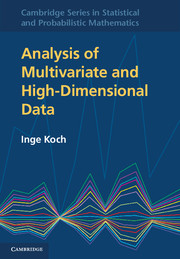Book contents
- Frontmatter
- Dedication
- Contents
- List of Algorithms
- Notation
- Preface
- I Classical Methods
- II Factors and Groupings
- 5 Norms, Proximities, Features and Dualities
- 6 Cluster Analysis
- 7 Factor Analysis
- 8 Multidimensional Scaling
- Problems for Part II
- III Non-Gaussian Analysis
- Problems for Part III
- References
- Author Index
- Subject Index
- Data Index
7 - Factor Analysis
from II - Factors and Groupings
Published online by Cambridge University Press: 05 June 2014
- Frontmatter
- Dedication
- Contents
- List of Algorithms
- Notation
- Preface
- I Classical Methods
- II Factors and Groupings
- 5 Norms, Proximities, Features and Dualities
- 6 Cluster Analysis
- 7 Factor Analysis
- 8 Multidimensional Scaling
- Problems for Part II
- III Non-Gaussian Analysis
- Problems for Part III
- References
- Author Index
- Subject Index
- Data Index
Summary
I am not bound to please thee with my answer (William Shakespeare, The Merchant of Venice, 1596–1598).
Introduction
It is not always possible to measure the quantities of interest directly. In psychology, intelligence is a prime example; scores in mathematics, language and literature, or comprehensive tests are used to describe a person's intelligence. From these measurements, a psychologist may want to derive a person's intelligence. Behavioural scientist Charles Spearman is credited with being the originator and pioneer of the classical theory of mental tests, the theory of intelligence and what is now called Factor Analysis. In 1904, Spearman proposed a two-factor theory of intelligence which he extended over a number of decades (see Williams et al., 2003). Since its early days, Factor Analysis has enjoyed great popularity and has become a valuable tool in the analysis of complex data in areas as diverse as behavioural sciences, health sciences and marketing. The appeal of Factor Analysis lies in the ease of use and the recognition that there is an association between the hidden quantities and the measured quantities.
The aim of Factor Analysis is
• to exhibit the relationship between the measured and the underlying variables, and
• to estimate the underlying variables, called the hidden or latent variables.
Although many of the key developments have arisen in the behavioural sciences, Factor Analysis has an important place in statistics. Its model-based nature has invited, and resulted in, many theoretical and statistical advances.
- Type
- Chapter
- Information
- Analysis of Multivariate and High-Dimensional Data , pp. 223 - 247Publisher: Cambridge University PressPrint publication year: 2013

